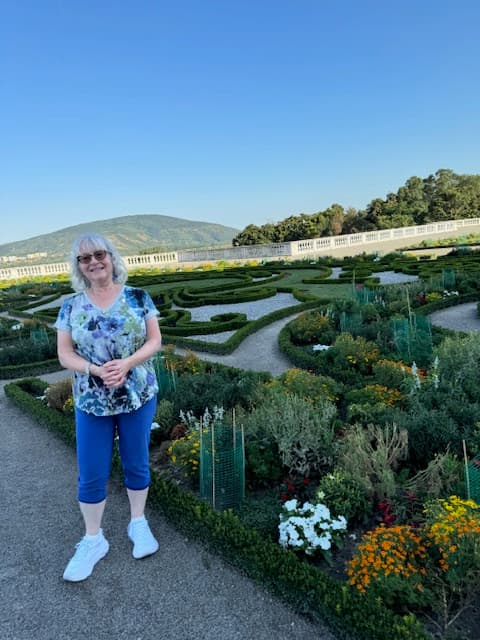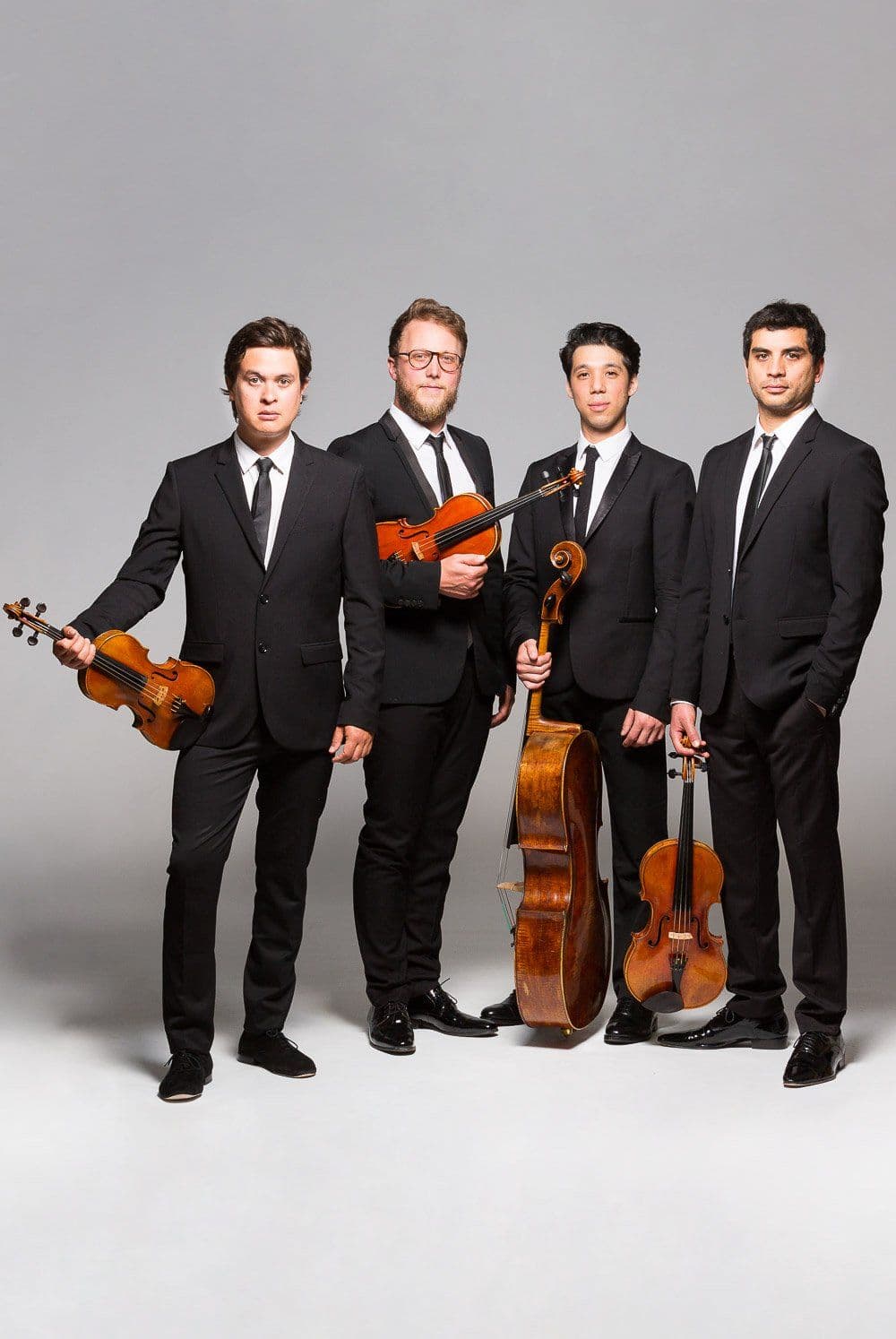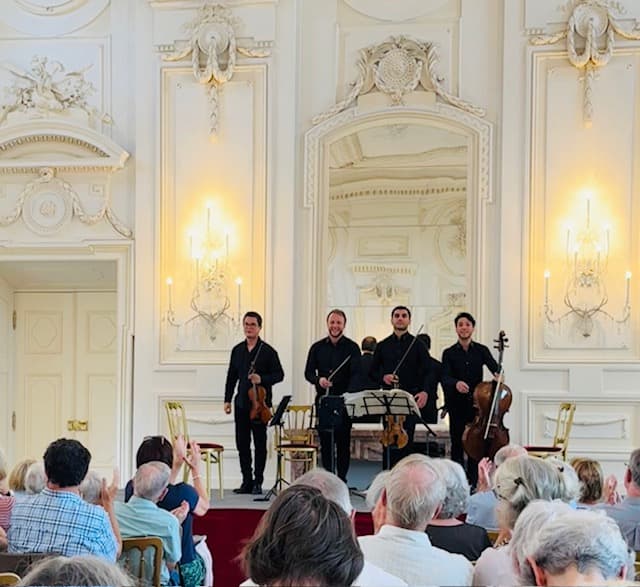Sometimes, when we don’t expect it, we are treated to an exceptional, uplifting, and memorable performance. While I was on a recent vacation in Europe, I was fortunate to attend a private performance given by the marvelous string quartet Quatuor Van Kuijk at the ornate Neo-classical Schloss Hof, Festsaal, in Hainburg, one of the lesser-known Habsburg residences in Vienna. The palace was the summer residence and hunting lodge of the Hapsburgs and rebuilt for Prince Eugene of Savoy, the most celebrated soldier who served the Hapsburgs. In the 1760s, during Empress Maria Theresa’s time, she transformed the residence for her daughter and youngest son. The massive grounds (50 hectares, or over 5 million square feet!) and exterior gardens are exquisite and were considered the finest in all central Europe. Imitating the French gardens of Europe, it includes gardens and greenery, fountains, sculptures, a labyrinth, indoor riding arenas and stables, and the grand sphinx staircase.

The Paris-based Quatuor Van Kuijk, presented a concert program that included Mozart String Quartet K. 80, an early work followed by two well-known and much-loved string quartets: Haydn Op. 74 No. 3, the ‘Rider’ and Mozart K. 465 the ‘Dissonance.’ Having heard (and performed) these much beloved works, I didn’t anticipate how impressed I would be by the seamless playing, the well-matched and pure sound quality, the flawless intonation, and the fresh interpretation especially of the two popular and arguably most famous quartets, the ‘Rider’ and the ‘Dissonance’. As a string player I was very taken by the first and second violinists as they traded off lines. They are so well matched; it was as if one violin was playing. The violist and cellist also impressed me. Their depth and richness of sound, even the pizzicatos, had a marvelous resonance. The audience was quite mesmerized, and I wanted to get to know them better to bring them to our Interlude audiences.
Quatuor Van Kuijk, is considered a quartet to watch. In 2015 they won the Wigmore Hall International String Quartet Competition and with musicians Nicolas Van Kuijk, Violin, Sylvain Favre-Bulle, Violin, Emmanuel François, Viola, and Anthony Kondo, Cello, their debut album recorded on the Alpha Classics label, of Mozart, dazzled audiences and critics alike. Recordings of Debussy, Ravel, and Schubert followed. They stayed busy. Two more discs featured the quartets of Mozart in 2020, and the complete cycle of Mendelssohn’s String Quartets in 2022 – 2023 won the ‘Quarterly Critic’s Choice’ Prize of the Deutschen Schallplattenkritik. These Mendelssohn Quartet recordings were named Gramophone’s Best Classical Music Albums of 2022.
Felix Mendelssohn: String Quartet No. 4 in E Minor, Op. 44, No. 2, MWV R26 – IV. Presto agitato (Van Kuijk Quartet)
Quatuor Van Kuijk made international debuts at the Library of Congress, DC, and Sydney Opera House, last season, the ensemble’s 10-year anniversary, and the 2023-24 season has included their Carnegie Hall debut, and concerts at Shanghai’s Symphony Hall and Tokyo’s Hamarikyu Asahi Hall. I’m impressed to see that they like to collaborate with other artists including Quatuor Danel, who I recently interviewed.

Quatuor Van Kuijk
Here is my conversation with Nicolas, the first violinist of Quatuor Van Kuijk.
What drew you four musicians to form a quartet?
The string quartet literature offers a limitless treasure trove of extraordinary richness, where each of the great composers have contributed some of their finest works. The human adventure also lies at the heart of our quartet’s beginnings—It’s a relationship. Spending so much time together can result in tensions but it is also so satisfying to work to find a middle ground. And it’s simply much more enjoyable to travel as a group of four rather than alone. Everything makes sense as soon as we walk out on stage. Nothing is set in stone; we enjoy the constant evolution, an interaction rich in dialogue.
You are generously supported by several organizations, Pirastro, SPEDIDAM, and Mécénat Musical Société Générale which has included the loan of lovely instruments. Can you describe how this patronage has helped you and made the difference in your success?
Mécénat has been incredibly valuable to us, and we are so grateful. The organization has allowed us to play several magnificent instruments, including a Giovanni Battista Guadagnini, (1711-1786), an Alessandro Gagliano, by the Neapolitan instrument maker (1665-1732), and a Grancino cello, of the Milanese violin maker (1637-1709). This is an extraordinary privilege. Moreover, Mécénat’s sponsorship extends beyond the loan of instruments. We’ve received significant financial support, which greatly simplifies the logistical aspects of quartet life, (traveling can be a nightmare!) and enables us to carry out projects we otherwise wouldn’t have been able to realize.
Who selects the repertoire and what repertoire is especially inspiring or challenging?
Actually, we select the repertoire collectively, years in advance. Each of us shares our preferences, and we find a compromise that satisfies everyone. Regardless of the chosen pieces, we immerse ourselves fully in the music to feel comfortable. Naturally, some works are more demanding than others—late Beethoven, for example. They pose quite a challenge.
Mozart was your critically acclaimed and award-winning debut recording. After recording and performing such a variety of other quartets, Debussy, Ravel, Mendelssohn, and contemporary works Britten, Bartók, Kurtag, what has inspired you to return to Mozart? Has your approach changed over time?
Mozart was one of our first loves and a starting point for us. We grew up with this music as quartet musicians, and it speaks to us deeply. I would say that each time we return to Mozart, it feels like we are reconnecting with something fundamental to our identity as performers.
Wolfgang Amadeus Mozart: String Quartet No. 14 in G Major, K. 387 – III. Andante cantabile (Van Kuijk Quartet)
You branched out with the Viola Quintets K. 515 and K. 516 with Adrien La Marca. Did you encounter different challenges in Mozart’s quintets?

Quatuor Van Kuijk at Schloss Hoff
Recording the two Mozart quintets was indeed a challenge. Not only are these longer pieces, but having an additional musician adds a completely new dynamic—another personality as well as a different dimension musically. Adrien, of course, is a very attentive chamber music partner, and we had a great time recording with him—it felt like he was part of the quartet.
Wolfgang Amadeus Mozart: String Quintet No. 4 in G Minor, K. 516 – I. Allegro (Adrien La Marca, viola; Van Kuijk Quartet)
We were privileged to hear your performance of Mozart K. 80, an early work, followed by two well-known and much-loved string quartets: Haydn Op. 74 No. 3, the ‘Rider’ and Mozart K. 465 the ‘Dissonance.’ How do you think Mozart developed and was influenced in his approach to writing his quartets?
Written between December 1782 and January 1785 and published that year, the six quartets dedicated to Haydn include the Dissonance No. 19, K. 465. Mozart, who sometimes performed quartets with Haydn, sought to pay homage to Haydn with these quartets. The weight and responsibility of following in Haydn’s footsteps was significant, and Mozart struggled to write them. We know he was prolific, and usually he wrote extremely quickly but these works took him years—a significant undertaking for him. And the result is these quartets are masterful.
Wolfgang Amadeus Mozart: String Quartet No. 19 in C Major, K. 465, “Dissonance” – I. Adagio – Allegro (Van Kuijk Quartet)
Wolfgang Amadeus Mozart: String Quartet No. 19 in C Major, K. 465, “Dissonance” – III. Menuetto: Allegretto (Van Kuijk Quartet)
You recently celebrated 10 years as a quartet. What special projects are you hoping to undertake in your next decade?
For our tenth anniversary, we treated ourselves to a collection of several transcriptions of French music. We explored works by Debussy, Fauré, Ravel, Satie, and Poulenc. Additionally, we commissioned a piece by Baptiste Trotignon entitled “Ces Messieurs”, which draws inspiration from these composers. The new album, Impressions Parisiennes, was released just last week, in late August 2024, on Alpha Classics. Looking ahead, we hope to create a festival, a sort of laboratory where we can combine various artistic disciplines and imagine new concepts for different types of concerts.
It was a wonderful chance encounter and privilege to have the opportunity to hear Quatuor Van Kuijk live and in such a gorgeous setting. I hope you will be able to hear them too but, in the meantime, have a listen to their exceptional recordings.
For more of the best in classical music, sign up for our E-Newsletter




